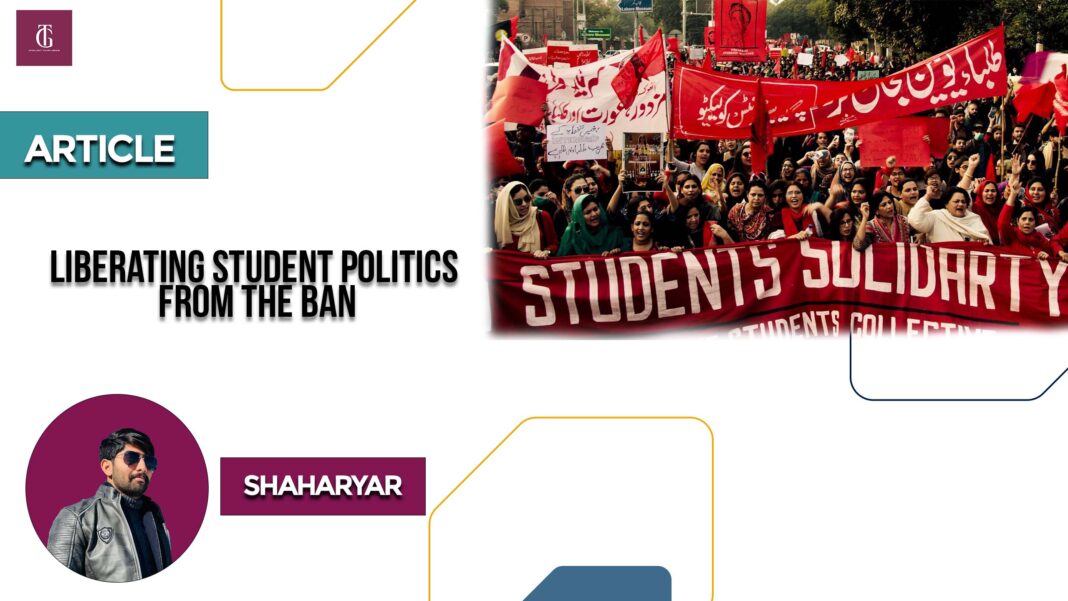
Banning is often seen as a solution in Pakistan for various challenges and issues. There has been a cultural tendency to resort to banning to address problems or conflicts. This approach is far outdated for the current era in which everyone is well aware of their natural rights, suppressing these natural rights lead to violence. This culture of banning can be observed in different aspects of society. I am concerned about the ban on students’ politics in educational institutions all over the country.
In the current era, one has to choose a new approach to address national issues like the legalization of student unions. Education would be the best approach to identifying and solving any problem. To learn what caused the student unions to be banned have to take into account the historical realm of student politics.
Pakistan has a long history of the militarization of democracy starting from General Ayub’s reign to the current era. Mainly Ayub’s and Zia’s eras caused the damage to nurseries of Democracies. In General Ayub’s reign student politics was a significant hindrance to his cathedra. In 1968, a countrywide movement was started by student organizations instigated by the incident in which Police put the charge of smuggling on a group of students and a clash took place between them. At that time a systematic struggle started by all student unions of East and West Pakistan against an authoritarian regime. This struggle caused many students to lie on deathbeds. Such incidents embedded the seeds of violence in student politics.
Political Interference in student unions became the major reason for their ban. Student unions in Pakistan have historically been affiliated with political parties and have often been accused of engaging in violence, terrorization, and other illegitimate activities on behalf of their affiliated parties such as MSF (Muslim Student Federation) and DSF (Democratic Student Federation) associated with Muslim League and Communist Party of Pakistan respectively. Political parties began meddling in student unions through money and influence during military rule, using them as their proxies protesting against military rule and also providing them safe havens for their heinous crimes.
Zia’s rule is notorious for the ban on student politics because the military dictator was well aware of the potential of nurseries of democracies against his military rule. He used religion as a tool to manipulate the masses for the legitimization of his dictatorship. Active Participation of Youth in State-sponsored Jihad in Afghanistan against the USSR and Zia’s Islamization built an environment in which the students only picked up the violence, values of extremism, and weapon culture. Radical student unions took an active part in protests against the Zia ul Haq authoritarian regime. Campus Violence increased and society became polarized which caused severe damage to the social and democratic values. All these were the blessings of state-sponsored Jihad in Afghanistan and Zia’s military regime. Following these reparations, General Zia banned student politics just like he banned democracy in country politics.
After mapping out the roots of violence in student politics now we will focus on why student politics is necessary for all realms of society, especially in Pakistan where democracy is on a ventilator, and how to abstain students from being manipulated by different mafias.
Student politics, the active engagement of students in political activities and decision-making processes on campus, holds immense importance in driving progressive change. Student politics have the potential of promoting social awareness by creating different platforms to set off students to think critically. Student politics fosters an environment where students can engage in critical discussions, exchange diverse perspectives, and challenge societal norms. Diverse social issues such as gender equality, climate change, social justice, and mental health would be broadcasted by students to make the masses aware. Student unions can serve as a catalyst for educational reforms by advocating for inclusive curriculums and diverse perspectives, fighting for affordable and accessible education, and addressing the systemic issues in the educational system. Campus policies can also be made student-friendly by active student politics through student councils serving on the campus. Hence, student politics is necessary for the betterment of campus policies and society at large.
Now our country is in dire need to lift the ban on student politics and unions. Our legislators have to foster their attention toward this pressing national issue. Once the ban is lifted the government should direct university authorities, especially professors and former leaders of unions to guide new generation students of their true potential and also guide them about the technicalities of running a union peacefully.
Here are some recommendations that would help student unions not to fall at the mercy of the elite, politicians, and other manipulators.
To revive student unions at the national level, first, we have to develop non-violent student councils by collaborating with university administrations all over the country. According to Aristotle, every state can be characterized by three distinct classes: the very rich, the very poor, and the middle class. Aristotle believed that moderation and finding the mean between extremes is ideal for governance. In this condition, people are most likely to follow rational principles, leading to well-administered states. Aristotle argued that states with a large middle class are more likely to be successful. The presence of a strong middle class prevents either extreme from gaining dominance, thereby ensuring balance and stability in governance.
Extending the principle of Aristotle’s politics, these councils should be developed by the rational and intellectuals neither by the extremists nor by the illiterates. These students should nominate themselves for certain positions in the council. Autonomous elections should be arranged by the students and university administration. As students of social sciences have the subjects of democracy and electoral politics in their course. These students should raise awareness about the theoretical approaches of their subjects which would be used practically to conduct elections. These students should be promoted to practice direct democracy and implement the theories of electoral politics such as spatial theory, directional theory, behavioral theory, and mobilizational theory to mobilize the electorate to elect the candidates who align with their preferences.
This would cause numerous benefits, for instance, students would learn the implications of theoretical approaches that they have applied and would be able to present new social theories in their subject. The candidates would be able to understand the voter’s preferences and behaviors and learn how to mobilize voters and how to target particular voter segments to gain maximum voters in council elections and then in general elections when they get the chance to participate in the country’s politics. Lifting the ban on students’ politics, our educational system would be able to produce the philosophers and true politicians that would help the country to get rid of the test-tube politicians. Then, these politicians would also make the country prosper.
After conducting fair and free elections, the university administration would form a committee comprising professors, former union leaders, and the elected candidates. That committee would lay out the constitution for the working of the council. That constitution would be comprehensive and will cover every detail about the functioning of the council. After that student council should serve the interest of the students and enhance the involvement of students in campus politics. If the student council project becomes successful, then these councils should be directed to make student unions at the provincial and national levels under some guiding principles which would avoid violence. By continuing the ban we are wasting the potential of our youth which would lead the country to detrimental consequences.
Finally, reviving student politics is a critical step toward developing a politically engaged and active youth population in Pakistan. It would foster a culture of democracy, civic involvement, and critical thinking, all of which are necessary components of a vibrant and progressive society. The country can leverage students’ potential to promote good change and construct a brighter future by giving them a platform to express their opinions, contribute to decision-making, and solve social concerns.

Shaharyar Rafique
The writer is a student of political science at School of politics and international relations at Quaid-i-Azam University, Islamabad.






